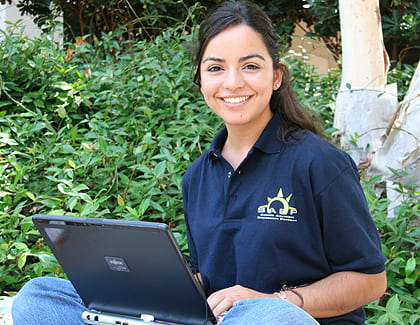Raising her sights
Student Ana Urzua sets new goals thanks to Summer Academic Enrichment Program

Ana Siria Urzua, a third-year anthropology major, never thought about getting a doctorate until she attended UCI’s Summer Academic Enrichment Program. Offered through the School of Social Sciences, the five-week program teaches students – mostly from low-income, immigrant-origin families – the skills to succeed in college and graduate school.
“I had never seriously planned for it, but a doctorate has just become a real possibility,” says Urzua, one of 17 students who attended the program in July. “I have a plan, and I know I’ll be using the rest of my time at UCI well.”
Her plan includes choosing classes based on professors whose research interests align with hers and participating in the Undergraduate Research Opportunities Program; both steps can help her get into graduate school.
Urzua recently received a valuable tool for reaching her goal: She’s one of 30 students in UCI summer outreach programs to receive a Fujitsu notebook computer, printer and scanner through the company’s participation in a $30 million “Grant of Technology.” (Other UCI recipients are in the Summer Bridge program for incoming freshmen; the California Alliance for Minority Participation in Science, Engineering and Math; and Orangewood Guardian Scholars Program for foster youth.)
It’s the first computer Urzua has had to call her own. For years, she shared a desktop computer with two of her siblings, both students, in their home in Garden Grove – vying for computer time whenever papers were due. Recently she’s been sharing a laptop with her mother, who went back to school part-time; having unlimited access to her new computer will allow her to pursue her studies without time constraints.
Urzua is the only child in her immigrant family who isn’t a U.S. citizen. Her family moved from Mexico to Los Angeles after she was born.
“I’m an immigrant child; that raises a number of obstacles for many who are like me,” she says. “It’s because of these obstacles that the summer enrichment program and the people involved are so special. They have opened numerous doors to me simply by showing me that they are there and the opportunity is mine for the taking.”
The program focuses on first-generation social sciences students; it grooms them for graduate study by teaching them advanced research methods, computer-based analysis, statistics and writing skills.
“I’ve been impressed by Ana’s ability to think broadly, her willingness to understand views distinct from her own and her growing skill at working collaboratively through the program,” says Caesar Sereseres, director of the summer enrichment program and associate professor of political science.
The program introduced Urzua to faculty members, doctoral students and its graduates, inspiring her to pursue a range of research possibilities, including projects on nutrition and ethnicity. She teaches Son Jarocho, a folk music and dance style from Veracruz, Mexico, to students at the El Centro Cultural de Mexico in Santa Ana, and wants to study how raising the children’s cultural awareness through music lessons affects their academic performance.
She says she now feels like part of a community of scholars: “I’ve recognized our potential as individuals and a group. There are real possibilities for change if we stick together.”